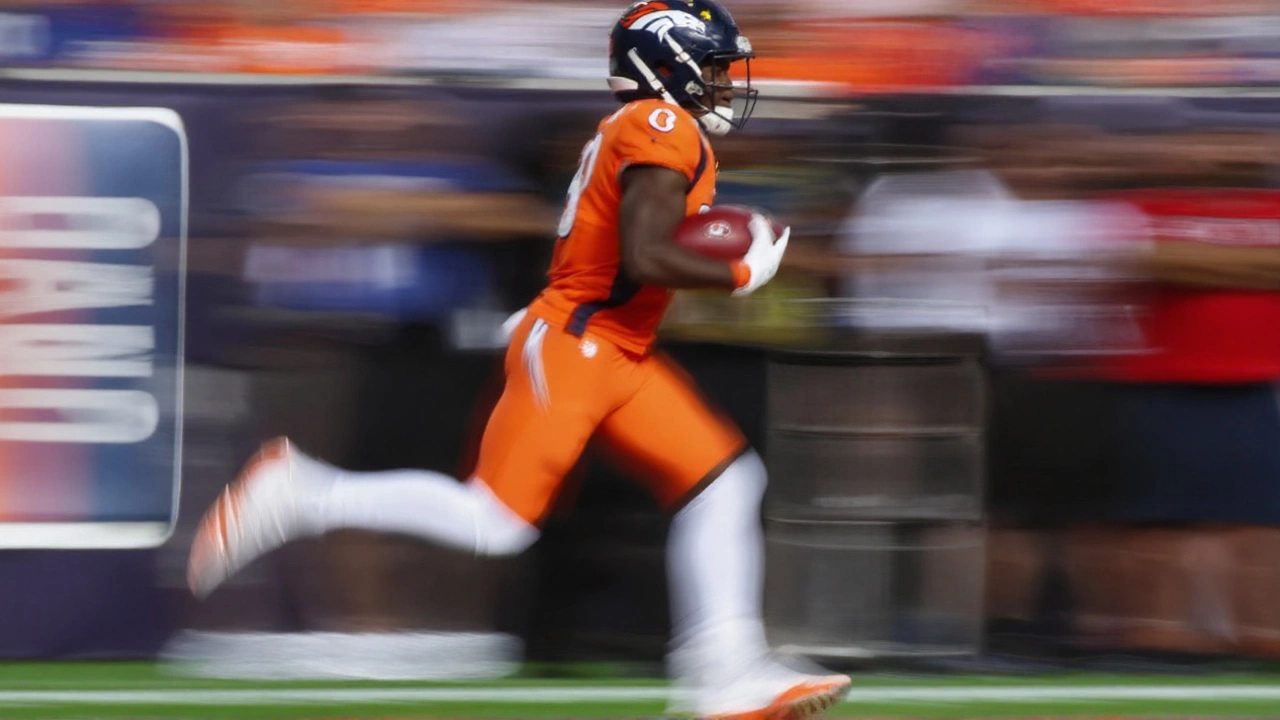
Six sacks, four takeaways, and still a loss: Titans stumble in Cam Ward’s first start
Six sacks. Four takeaways created by Tennessee’s defense. A 20-12 loss anyway. That’s the uncomfortable math from the Titans’ season opener in Denver, where the debut of Cam Ward turned into a lesson about life in the NFL when protection breaks down and chances slip away.
The first overall pick finished 12-of-28 for 112 yards with no touchdowns and a late fumble that sealed it. He was hit often, chased even more, and sacked six times—matching the infamous number David Carr took in his 2002 debut. That parallel isn’t just trivia. It’s a warning sign for any team breaking in a young quarterback behind an unsteady line.
Tennessee’s defense did the job, and then some. The Titans picked off Broncos rookie Bo Nix three times and forced a fumble, gift-wrapping short fields that usually swing games in September. The offense managed just six points off those four takeaways, settling for two Joey Slye field goals. The gap between what the defense delivered and what the offense produced decided this opener.
Ward didn’t hide his frustration afterward. He owned the missed chances, the stalled third downs, the misfires that came when bodies were collapsing the pocket. For a player who climbed from a zero-star high school recruit to the top pick in the draft, Sunday was a reminder that the step from college star to pro starter is steep and unforgiving.
The sequence of blown opportunities told the story. With 49 seconds left in the first quarter, Roger McCreary jumped a pass intended for Courtland Sutton and returned it to the Denver 32. Moments later, Tony Pollard put the ball on the turf. A strip-sack from Jeffery Simmons in the second quarter, recovered by Sebastian Joseph at the Broncos’ 38, set up a 33-yard Slye kick. In the second half, Xavier Woods ran back another interception to the Denver 26, and again the Titans had to settle, this time from 35 yards. Good defense, wasted leverage.
Meanwhile, Denver capitalized. Sutton found the end zone, J.K. Dobbins ripped a 19-yard touchdown run in the fourth quarter, and that was the back-breaker, stretching the lead to 20-12. With the Titans offense sputtering, eight points felt like 18.
The broader numbers were just as harsh. Tennessee gained 134 yards on 55 plays—about 2.4 yards per snap—and went 2-for-14 on third down. That’s not a rough day; that’s an offense stuck in mud. The plan leaned conservative early, but even when the Titans opened up, Denver’s rush beat the timing of routes and closed passing windows before Ward could exploit them.
To be clear, this wasn’t a rookie overwhelmed by the stage from start to finish. Ward flashed the traits that made him the top pick. He extended a handful of plays with calm feet and strong balance, including a sharp 29-yard improvisation to Pollard while bracing for a hit. His pocket movement made the first rusher miss more than once. The problem was the second and the third rusher kept arriving.
There’s also context that matters. Since 2000, quarterbacks taken first overall are now 1-15-1 in their opening games. Only Caleb Williams broke through last year with the Bears. Week 1 is cruel to rookies: unfamiliar looks, fast defenses, and game plans that test protection rules right away. Denver leaned into that playbook, mixing pressure, sugaring the A-gaps, and forcing the Titans to block in space and communicate on the fly.
The David Carr comparison is unavoidable because of the sack count. Carr was sacked an NFL-record 76 times in his rookie season and 249 times during his Texans tenure. That wasn’t just about a quarterback holding the ball—it was a system and personnel issue that never stabilized. The Titans don’t want that cautionary tale anywhere near Ward’s timeline. If anything, Sunday should light a fire under the protection plan for Week 2.
So what went wrong beyond the obvious heat off the edge? A few threads stood out on first watch. The Titans rarely found rhythm on early downs, which left Ward facing third-and-long far too often. The quick game was there in flashes, but spacing and timing looked a beat off, and Denver’s corners contested at the catch point. When Tennessee tried to slow the rush with screens, the Broncos closed fast.
Ward’s ball placement wasn’t perfect, but the misses were often born from traffic—throws off-platform, windows shrinking as he released, lanes closing at the line. He didn’t force many reckless balls downfield, which is a good sign. The flipside: the Titans seldom threatened deep enough to loosen Denver’s coverage. Without a vertical answer, the Broncos sat on intermediate breaks and drove on underneath routes.
There’s a coaching layer here too. Titans head coach Brian Callahan has been clear about building an offense around timing, options for the quarterback, and getting the ball out. That didn’t show consistently on Sunday. Expect adjustments—more compressed formations to create cleaner releases, more motion to identify coverage, and more movement passes to change launch points and stress the defense horizontally.
On the other sideline, Denver survived its own rookie lumps. Nix turned it over four times, yet the Broncos still controlled the game state because the defense dictated tempo and the offense protected the ball late. Sutton’s touchdown and Dobbins’ burst run were enough with the way the front seven played. It wasn’t pretty, but September wins rarely demand style points.
For Tennessee, the special teams ledger was mixed. Slye knocked through both field goals set up by turnovers, but drives died too soon to force Denver to defend the goal line. The punt team was busy, and with the offense unable to flip field position, the defense had to keep bailing water. They did for three quarters, until they didn’t.
One thing the locker room made clear: there isn’t panic. The defense saw how its plan confused Nix and created chances. The offense knows it left points all over the place. For Ward, the lesson is practical—take the throws the structure gives you, live for the next snap, and trust the plan will loosen up once the run game and quick outs start stacking.
All of this lands differently because of Ward’s path. He threw for 948 yards as a high school senior at Columbia High and didn’t draw stars from recruiting services. At Incarnate Word, he won the 2020 Jerry Rice Award as the top FCS freshman. At Washington State, he leveled up as a passer and leader. At Miami, he won the 2024 Davey O’Brien and Manning Awards and proved he could command a big stage. Sunday’s start doesn’t erase any of that—if anything, it sets the next mile marker: how fast can he translate those tools against NFL speed?

What has to change before the Rams visit Nashville
The fixes aren’t mysterious; they’re about execution and emphasis. Tennessee has a week to get them on tape.
- Speed up the first read. Build in more rhythm throws on first down—hitches, quick outs, slants off motion. If defenses feel the ball leaving fast, the rush slows a half-step, and Ward gets into a flow.
- Move the launch point. Sprint-outs, nakeds, and designed half-rolls help the line by cutting the field in half and forcing rushers to flatten out.
- Help the edges. Chip with tight ends and backs on obvious passing downs. Even a nudge changes timing and lets deeper routes develop.
- Lean into screens and draws. They’re not magic, but a couple of successful calls punish overaggressive fronts and force linebackers to hesitate.
- Simplify third-and-medium. Pick your best two concepts and rep them to muscle memory. On third-and-4 to third-and-6, the ball has to be out.
Personnel usage will be part of the conversation. Expect Tennessee to test different combinations at tackle and guard if the film shows consistent leakage. The staff may also emphasize heavier sets—two tight ends, condensed formations—to create cleaner releases and boost the run game. Pollard’s early fumble stung, but he remains a key outlet in the pass game; that 29-yard catch on the scramble drill was a reminder of how he can help Ward when plays go off-script.
For Ward, the self-scout is straightforward. Trust your feet. Don’t drift in the pocket; climb when the edge rush arcs past. Take the six-yard throw on first down rather than hunting a tougher window on second-and-10. You could see him start to adjust in the second half, snapping the ball out quicker and choosing exits with purpose. Those small choices stack up.
Defensively, Tennessee can build on a lot. McCreary, Woods, and Simmons each flipped the field with impact plays. The front disguised pressures cleanly and squeezed Nix into hurried decisions. If the offense meets them halfway next week, this is the kind of group that can tilt games.
As for the broader narrative? First-overall quarterbacks usually take on water in Week 1. The league challenges them early. The question isn’t whether a debut is glossy; it’s how fast the counterpunch comes. Ward’s resume says he adjusts fast. He’s reinvented himself at every stop—from Incarnate Word to Pullman to Coral Gables—and learned a new language each time. Denver was hit No. 1. Now comes the response.
The Rams will bring a different front, a different coverage philosophy, and plenty of tape with clear tells after Sunday. Tennessee’s staff will spend the week carving out the easy stuff for Ward and protecting the edges long enough to take a couple of calculated shots. Even one deep completion can change how a defense aligns on early downs.
There’s a fair way to frame it: Week 1 was a reality check, not a verdict. The Titans have a defense that takes the ball away and a rookie quarterback who won’t flinch. Marry those two, and the scoreboard will look different. Leave them separated, and the numbers—2-for-14 on third down, 134 total yards, six sacks—will keep telling the same story.
For now, the headline is simple. The Titans had enough chances to win in Denver and didn’t. Ward’s first page in the pros is written in pressure and missed chances. The next page gets written in Nashville.
